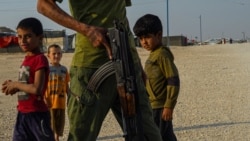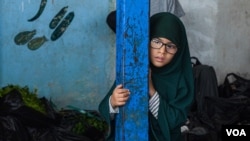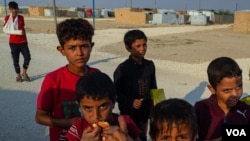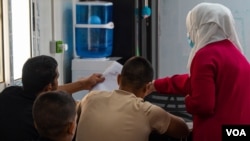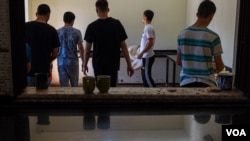At 21 years old, Noah Soulay is a grown man. He is tall, slim and speaks English with an American accent. He says he lived in New York for some time as a child. He is now incarcerated in Syria.
When he was 12, Soulay's stepfather brought him and his mother here from Trinidad and Tobago to join Islamic State. At the height of its power, the militant group held land that was roughly the size of the United Kingdom in Syria and Iraq.
IS's land-claim and the terror they inflicted on the world have faded into a bizarre chapter of history. But tens of thousands of its former members from dozens of countries remain imprisoned in northeastern Syria. Also locked away are about 30,000 of their children, many who have never known a day of freedom.
"Sometimes I feel like there's no hope, you know?" says Soulay. "We are living for no reason. My life has no meaning."
Soulay has been imprisoned since he was captured at 16 years old, holding an AK-47 with men who appeared to be seasoned foreign militants.
Initially, Kurdish regional authorities put him in an adult jail, but he was soon transferred to al-Houri Rehabilitation Center, which holds boys from IS families who have not been accused of crimes.
Al-Houri is surrounded by thick concrete walls, topped with barbed wire and armed guards. It also has a school that teaches science, music, English and Arabic. It is nicer than the adult prisons in the region that we have seen, where men live packed in small, dirty rooms without fresh air, clean bathrooms, enough food or medical care. But it is a prison.
"If we put them in with adult prisoners they will be radicalized," says a camp manager, who declines to give his name because he is afraid of being targeted by whoever killed another al-Houri manager two years ago. "It's a big problem for us."
However, al-Houri is often filled well beyond capacity, and many boys are delivered to prison when they turn 18, regardless of the risk and the injustice. If they are Syrian, they may get a trial and may be released. Foreigners, however, are kept in jail indefinitely.
The camp manager now, and others who held the job before, acknowledge that keeping children who have never been accused of crimes locked up is wrong. But they say the countries where the boys came from should retrieve their children. They don't know what else to do with them.
The boys say they are deeply depressed and lonely. They never chose to be involved with IS.
"I don't know what's happening with me," says Soulay. "I just wake up every morning hoping that one day, someone's going to come and tell me: it's time to go home."
Childhoods erased
The younger boys at al-Houri and rehabilitation centers like it were toddlers when they were brought to IS. Some have no memories of life before the militant group.
When IS collapsed in 2019 at least 70,000 people fled the final brutal battle in Baghuz, Syria, including tens of thousands of children.
I remember watching children stumble out of the military trucks that carried them from a war zone that hardened militants later told us was "hell on earth." The children were dirty, thin and bleary eyed.
One boy answered a journalist's questions in a daze, saying his father was "present." When asked if that meant his father was present in this field, or present on the earth, he stared blankly.
The children and their mothers were gathered onto trucks and brought to camps while the men were lined up and carted off to prison.
In the years since, some of the foreign women and children were taken back by their home countries, and many Syrian families went home. But most of them still live in al-Hold and al-Roj camps, where the tents are cold, wet and muddy in the winter and sweltering hot in the summer.
Sometimes there are schools for the children provided by aid workers, but periodically those schools are burnt down by women who object to the non-IS curriculum.
"We won't go to any infidel school," Mohammed, 11, from Tajikistan, told us at al-Hol Camp, back in 2020. He later admitted he'd like to go to a school that teaches things like math and English. He just didn't want to be tricked into being a non-believer.
Guards call the camp a "ticking time bomb" because many residents are still IS ideologues. They believe that people they deem to be "infidels" should be killed. In the past five years there have been at least 130 murders.
I then took out a camera and Mohammed ducked behind Halan Akoiy, our translator. Mohammed later explained that at 11 years old, he was close to the age of being taken to prison. He didn't want the prison bosses to see his picture and come to get him.
"Why are they taking our boys to jail?" shouted Asma, a mother shopping in the nearby market stall. She was from Uzbekistan and overheard the conversation. "What did they do?"
Local officials are frank when asked why they snatch up boys as young as 12 and take them away from their families. According to the officials, without outside help, there is no other option. Otherwise, they say, the boys will become the next generation of militants.
We asked Mohammed if children here want to grow up to be IS fighters.
"Some kids don't want to," he answered. "But 99% of us want this."
Who to blame?
There is no plan to stop removing boys from their mothers, and guards say the detention system is expanding. Girls are left in the camps, also facing a lifetime of danger and degradation.
Amnesty International says the separation of children from their mothers is unlawful and that conditions in the camps and prisons are inhumane and sometimes deadly. The vast majority of the men and women in the system have not been formally accused of a crime or tried in a court.
Amnesty International blames the local Kurdish authorities—the Autonomous Authorities of the North and East Syria Region, which is made up of the civilian leadership, the Syrian Democratic Forces and other affiliated military groups. They also blame the United States, which backs the SDF.
"The U.S. government has played a central role in the creation and maintenance of this system," says a report the organization published in April this year.
Kurdish authorities are offended by the accusation that they are human rights abusers. They have spoken out countless times against the ill treatment of the IS detainees, saying they desperately need international help to solve what they say is an international problem.
Dozens of countries took credit in the defeat of IS in Syria, but they have been left virtually alone to clean up the mess. There are detainees from more than 70 countries, and while some prisoners have been repatriated, most remain in Syria.
"We are suffering here in the camp," says Khorsheed Haval, the al-Hol Camp Director, using a nickname for security reasons. "Our funding has decreased to only 30% of what is needed. Our healthcare is bad and people are dying, but there is no place to treat them."
These officials say IS attacks never stopped after the group was defeated in battle, and they are once again a growing threat. Amnesty International says the danger is not limited to Syria.
"While the threat of IS remains real worldwide," reads the April report. "The violations ongoing in north-east Syria only entrench further grievances and mean a generation of children have known only systematic injustice. The autonomous authorities, members of the U.S.-led coalition, and the U.N. must act to remedy these violations and end the cycles of abuse and violence."




